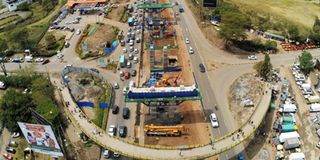China amplifies environmental protection in overseas projects

Ongoing construction of the Nairobi Expressway.
China’s Ministry of Commerce and the Ministry of Environment and Ecology have jointly released new guidelines aimed at helping Chinese enterprises investing overseas to improve environmental sustainability of construction projects.
From the new advisory, Chinese firms are encouraged to observe high standards in the design and implementation of infrastructure projects while fostering closer working relationships with host communities.
Where host countries have weak or non-existent environmental protection frameworks, Chinese enterprises are now encouraged to observe those of international organisations.
In January 2021, China's State Council Information Office issued a white paper on International Development Cooperation. According to the document, overseas investments should be innovation driven; with green development playing an important role in addressing the intensifying challenge of climate change, especially in developing countries.
Industrial parks
Other recent climate mitigation initiatives by China include the inauguration of a South-South Climate Cooperation Fund which is supporting establishment of low-carbon industrial parks, as well as climate mitigation and adaptation programmes that have so far benefited 34 countries around the world.
China’s public image abroad has a huge influence in the execution of its foreign policy. There is no doubt that Beijing’s governmental diplomacy has been instrumental in the speedy growth of China’s foreign relations in the last two decades.
Alongside the expansion of diplomatic reach, there has been growing visibility of Beijing as an economic partner for many countries around the world where trade, infrastructure construction and development projects financing have also taken root.
The construction sector has however attracted much scrutiny from conservationists and local media that have often faulted Chinese enterprises for flouting environmental regulations.
As the execution of the Belt and Road Initiative gains momentum around the world, improving environmental protection thresholds as well as communication with foreign publics are critical in offsetting any misunderstandings that may arise in the course of construction projects implementation.
With an increasing focus away from what Chinese leader Xi Jinping has previously described as vanity projects - hastily conceived and implemented, the newly released regulations form a good basis of co-construction of Belt and Road projects while hoisting sustainability and acceptability in recipient countries.
Diplomacy
A stronger public diplomacy framework can significantly complement the new guidelines in producing acceptable, beneficial and sustainable development outcomes for China and its development partners. Language barriers have often impeded communication between Chinese enterprises and local communities where they are running projects.
Embedding translators within project implementation teams while rolling out corporate social responsibility programmes can significantly ease such tensions by creating understanding while eliminating the underlying biases.
There is an increasing move by Chinese diplomats and enterprises to leverage social media as a tool to reach more segments of the foreign publics such as the media, civil societies and professional associations. This is also helping demystify the black box perception of China abroad. By tapping into the digital information loop, local agencies have the opportunity to engage with China in discussing local issues.
Even more critical, China’s partner countries and institutions should also actively explain their development partnership arrangements with Beijing to their citizens. China certainly has a responsibility to promote economic engagements abroad that are mutually beneficial and sustainable.
Local institutions
But the biggest stake lies with partner countries to ensure local populations understand the scope, expectations, and implications of projects implemented with support of development partners such as China.
As recipients of Chinese aid and architects of development cooperation with China, partner countries must be proactive in creating responsive levels of transparency and understanding with domestic audiences.
It is bewildering that in some countries, China is berated for the so-called opacity of contacts relating to development projects while the role and responsibilities of local institutions working on such projects with China are often ignored.
Green recovery has become a catchphrase following the Covid-19 global health crises. China is expected to play important roles in anchoring the world's economic turnaround through its reforms and opening up policies.
Greening its development assistance projects overseas is a good step in building more livable ecosystems around the world.
Twitter: @Cavinceworld





